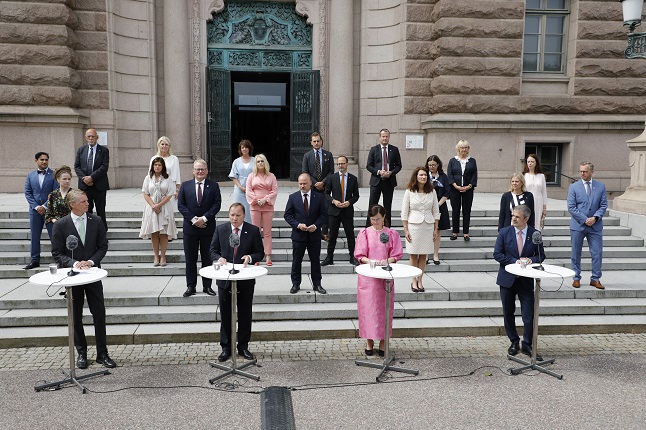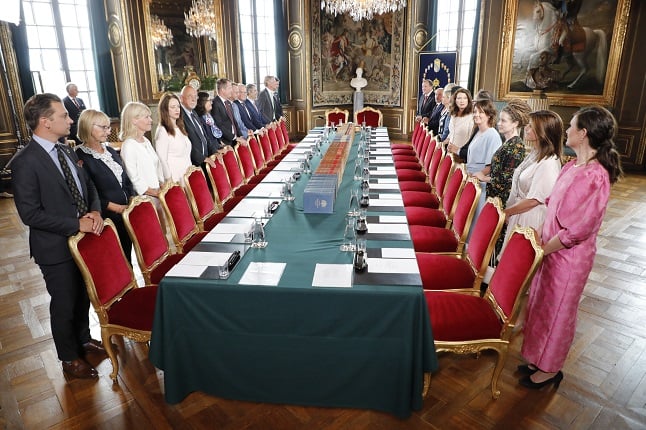Löfven said he would present his government declaration, outlining the policies it would pursue, in September, but cited his four key priorities as: work, safety, the climate and welfare.
“This is a challenging and very important time for Sweden. We have a new political situation in our country,” he said in a nod to the tight margins between the two traditional political blocs, which led both to him being voted down in the no-confidence motion and voted back in by just 176 MPs (175 were needed to either vote in his favour or abstain).
No new ministers were appointed in the third Löfven government (the other two came after general elections in 2014 and 2018), which once again is made up of members of the Social Democrats and Green Party, both on the centre-left of the political spectrum.
This means Sweden no longer has a Minister of Rural Affairs. The holder of that post, Jennie Nilsson, resigned so that she could return to her seat in parliament to take part in the vote on Löfven’s candidacy as prime minister. MPs leave their seats when they enter government and are replaced, but Nilsson’s replacement has been absent on long-term sick leave, leaving the seat empty.
Instead of bringing Nilsson back to the post, Löfven handed the responsibility for rural affairs to Minister of Trade and Industry Ibrahim Baylan, and may appoint a new minister when parliament reopens after the summer recess in mid-September. This means Baylan may play a key role in negotiations between junior coalition partner the Green Party and the Centre Party, whose support the government needs to pass its budget, because forestry legislation is one of the sticking points between the two parties.

The ministers in the government are the following:
Stefan Löfven (Social Democrats), Prime Minister
Per Bolund (Green Party), Minister for Climate and Deputy Prime Minister
Magdalena Andersson (Social Democrats), Finance Minister
Hans Dahlgren (Social Democrats), Minister for EU Affairs
Mikael Damberg (Social Democrats), Interior Minister
Anna Ekström (Social Democrats), Minister for Education
Tomas Eneroth (Social Democrats), Minister for Infrastructure
Matilda Ernkrans (Social Democrats), Minister for Higher Education and Research
Anna Hallberg (Social Democrats), Minister for Foreign Trade
Peter Hultqvist (Social Democrats), Minister for Defence
Lena Hallengren (Social Democrats), Minister for Health and Social Affairs
Morgan Johansson (Social Democrats), Minister for Justice and Migration
Ann Linde (Social Democrats), Foreign Minister
Ibrahim Baylan (Social Democrats), Minister of Trade and Industry
Amanda Lind (Green Party), Minister for Culture and Democracy
Åsa Lindhagen (Green Party), Minister for Financial Markets and Deputy Finance Minister
Lena Micko (Social Democrats), Minister for Public Administration
Eva Nordmark (Social Democrats), Minister for Labour
Anders Ygeman (Social Democrats), Minister for Energy and Digitalisation
Per Olsson Fridh (Green Party), Minister for Development Assistance
Ardalan Shekarabi (Social Democrats), Minister for Social Security
Märta Stenevi (Green Party), Minister for Equality and Minister for Housing
Löfven had two days to announce his ministers after being voted back in as Sweden’s leader.
That vote was called after Löfven became Sweden’s first ever prime minister to lose a motion of no confidence after the Social Democrats’ long-term ally the Left Party (which was opposed to suggested changes to Swedish rental laws, the issue that sparked the conflict) sided with the right-wing opposition to topple the government.
Löfven opted to resign rather than call a snap election, citing the ongoing Covid-19 pandemic as a reason to avoid prolonged political uncertainty. This sparked rounds of talks between party leaders, and after leader of the opposition Ulf Kristersson abandoned his own bid to form a government, the torch was passed back to the Social Democrat leader.




 Please whitelist us to continue reading.
Please whitelist us to continue reading.
Member comments